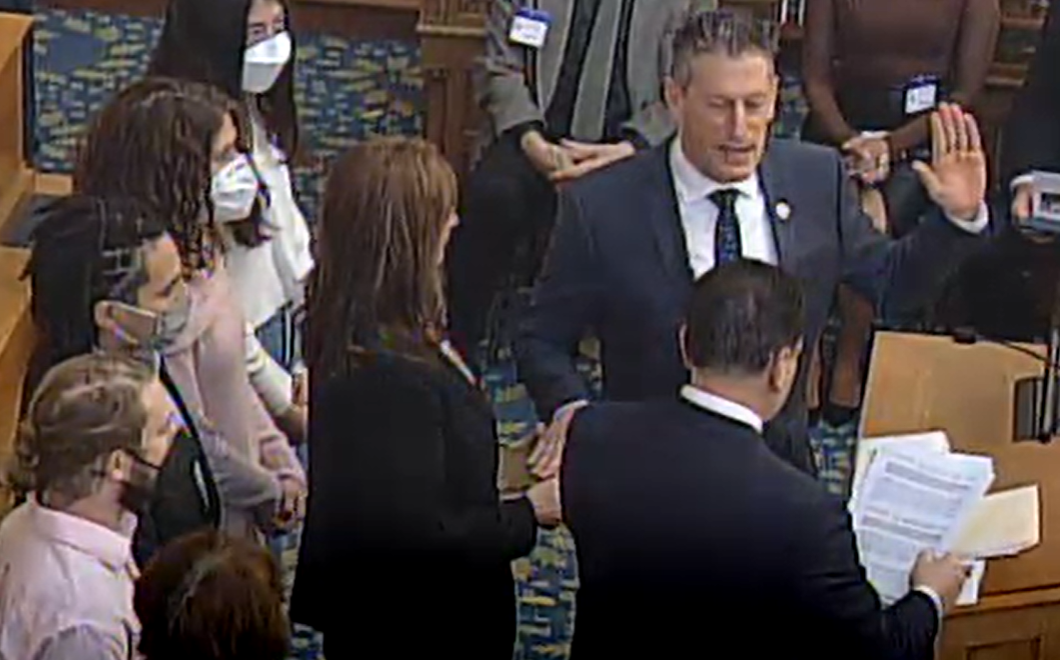Senate President Steve Sweeney’s 12 years atop the chamber ends today, and frankly I think he went out in the most Sweeney way possible: Fighting with Gov. Phil Murphy.
Sweeney refused to move an already pared down resolution extending some but not all of Murphy’s powers for 45 days instead of the 90 days the governor requested. This came after Murphy told reporters that he would keep the school mask mandate in place, which would mean declaring another public health emergency.
“We were not informed of them taking this action today and we will not move these resolutions today,” Sweeney said during his final voting session.
Politically, you can see where Sweeney’s coming from. He fought with Murphy in the first half of his term but eased up once the pandemic hit. Then he lost reelection in an absolute shocker to a candidate who railed against the governor’s coronavirus restrictions. And to be fair, it’s kind of moot anyway, as the Assembly had already announced they wouldn’t move it either.
There’s something comfortingly familiar about this kind of Trenton dysfunction. Same for Sweeney, apparently. “You know how it felt? It’s felt like any other day. It’s an honor to have had the opportunity to lead this place. You guys will miss me,” he told reporters.
Read more from Carly Sitrin here.
WHERE’S MURPHY? He’s not actually doing it when it’s broadcast, but his State of the State address will air at 5 p.m.
QUOTE OF THE DAY: “Once more unto the breach, dear friends…” — Henry V by way of William Shakespeare via U.S. Rep. Tom Malinowski, who used the quote from the play to announce he will seek reelection in 2022.
HAPPY BIRTHDAY -NJ LECET’s Francisco Maldonado-Ramirez, former Caldwell councilman Jeff Curley, former state Sen. Sonny McCullough
TIPS? FEEDBACK? HATE MAIL? Email me at [email protected]
UNTIL NEXT TIME — Pension-padding bill dies in New Jersey Senate, by POLITICO’s Matt Friedman: A bill to boost some lawmakers’ pensions, hastily scheduled for a Senate vote on Monday, is dead, according to two sources with knowledge of the legislation. The bill, NJ S4250 (20R), appeared designed to apply to Assemblymember Annette Quijano (D-Union) and potentially some other lawmakers. It was introduced last month and walked onto the Senate Budget and Appropriations Committee meeting last Thursday without notice, then amended to boost the pensions of some other lawmakers, including Assemblymember Ralph Caputo (D-Essex). Though the committee advanced the bill in a 7-5 party line vote, and the measure was placed on Monday’s Senate board list, the sources said it was opposed by many Democrats, who hold a majority in the upper house. By Monday afternoon, the bill had been removed from the Senate’s board list.
THE STAFF — With Nick Scutari ascending to the Senate presidency today, one key question is who his top staffer will be. Right now that’s still Kevin Drennan, who with the exception of a brief break in the private sector has been Sweeney’s top aide for the last decade. But if Drennan departs, look to Senate Democratic General Counsel Alison Accetolla as his likely successor. She’s been Scutari’s top aide on the Judiciary Committee, which he’s chaired for years, and prior to working in the Legislature served as an assistant public defender in Middlesex County and a consulting attorney for the Office of Reentry in Newark.
SO BASICALLY WHAT SWEENEY SAID MONTHS AGO— Legislature approves pared-down abortion rights bill, by POLITICO’s Daniel Han: Democrats in the state Legislature approved a fast-tracked bill Monday that codifies existing abortion case law into state statute, as Republicans in both chambers decried the medical procedure and criticized the bill’s rushed process. The legislation, NJ S49 (20R), was introduced late Thursday to replace the controversial Reproductive Freedom Act, NJ S3030 (20R). The new bill codifies into state law a woman’s right to an abortion as well as reproductive autonomy to those under “State control or supervision.” The Senate approved the measure, 23-15, while the Assembly passed it, 46-22, with eight abstentions. It now goes to Gov. Phil Murphy, who said late Monday that he would sign it.
THINK TANK TO BE CALLED ‘SAME DIRECTION NEW JERSEY’ — “As he exits, NJ Senate President Steve Sweeney joins think tank with comeback on his mind,” by The Record’s Charles Stile: “By noon on Tuesday, Senate President Steve Sweeney will lose the state police driver who whisked him back and forth from his home in Gloucester County to the Statehouse. He’ll lose his $65,000 lawmaker’s salary. He will lose the ornate office suite perched above the Senate, where he wielded power for 12 years. The burly 62-year-old lawmaker will just be Steve Sweeney, ironworker. And he’ll be adding a new role: director of a bipartisan ‘think tank.’ ‘I know — I gotta have smart people around me,’ he joked, suggesting that it might be hard to visualize a student of South Jersey union halls and construction sites sharing office space with Ivy League know-it-alls crunching tax data on spreadsheets. ‘Think tank with my name on it? I know.’ It’s also laughable to think that Sweeney is about to settle into a cozy political dotage by publishing yawn-inducing policy papers. In reality, his think tank is a means to keep him relevant and a vehicle to propel a comeback either in the Senate in two years or toward his elusive big prize, as governor, in 2025.”
—AP: “Sweeney era atop NJ Senate ends with gov campaign on horizon”
—NJ Advance Media: “Sweeney saying goodbye to N.J. Senate after stunning loss. But he vows: ‘I’m not done’”
FATHER CHRISTMAS, GIVE US SOME MONEY — “Pet projects, public cash: NJ lawmakers direct millions at last minute to favored causes,” by NJ Spotlight News’ Colleen O’Dea: “For every dollar lawmakers added directly to the budget over the past five years, districts controlled by Democrats got almost 95 cents, while Republican areas got a nickel. That cash often goes to ‘Christmas trees,’ pet projects that let the Dems who control the state Legislature spread the wealth. Case in point: Camden — one of the poorest cities in the country, it picked up close to $110 million in Christmas largesse. That includes $30 million to the Camden County Improvement Authority for demolishing buildings in the city and millions more for health groups, Rutgers University’s Camden campus and the joint Rowan University/Rutgers-Camden board of governors, an NJ Spotlight News analysis found. The two legislative districts that split Newark, the 28th and 29th, received roughly $69 million and $74 million, respectively, with University Hospital, New Jersey Institute of Technology, the city of Newark and Essex County College each receiving at least $10 million. Nine districts — eight of which are represented in part or in whole by Republicans — got nothing. The NJ Spotlight News analysis of last-minute spending added by legislators to the budgets for the 2018-2022 fiscal years shows the regional disparity in the process, which is controlled by legislative leaders, all of whom are Democrats.”
—“Sweeney saying goodbye to N.J. Senate after stunning loss. But he vows: ‘I’m not done’”
AND NOT STRAIGHT, EITHER — “The road to marriage equality in New Jersey was long,” by Raymond Lesniak for The Star-Ledger: “Thankfully, because of Goldstein’s work, with support from Senator Loretta Weinberg and gay and straight allies who fought for years for Marriage Equality in New Jersey, our Superior Court, in a decision by Judge Mary Jacobson, held that marriage equality was guaranteed under the New Jersey Constitution. Goldstein formed and financed Garden State Equality to fight for LGBTQI Rights in 2004 when civil rights for gays were in the dark ages, some states criminalized gay sexual relations, and many discriminated against gays in employment and housing. Back in 2004, same-sex marriage was the last thing on people’s minds, except for those who opposed it, but it was Goldstein’s ultimate dream, and he allowed nothing to get in his way, not governors, legislators, county and local officials, nor opposition from religious leaders, including some segments of his own Jewish religion.”
JUVENILE JUSTICE — “Justices give hope to juvenile offenders, allow sentencing review after 20 years,” by New Jersey Monitor’s Dana DeFilippo: “The New Jersey Supreme Court ruled Monday that juvenile offenders serving lengthy prison sentences may ask for sentencing review after they’ve served 20 years behind bars, a decision juvenile justice reformers celebrated as overdue recognition that children don’t deserve to be locked away for life. The ruling stems from the cases of James Comer, who was 17 when he was sentenced to 75 years behind bars for a deadly robbery spree in 2000, and James Zarate, who was 14 when he and his brother beat and murdered a 16-year-old girl in 2005. The court ordered new sentencings for both men, agreeing in Comer’s case that juveniles shouldn’t face the same mandatory sentences adults face and that courts must weigh a juvenile’s immaturity and other ‘hallmark features’ of youth in setting punishment, as they failed to do adequately for Zarate.”
ONLY SIX YEARS AFTER IT MATTERED — Same sex marriage now enshrined in New Jersey law, by POLITICO’s Carly Sitrin: Same sex marriage is now enshrined in New Jersey law. Gov. Phil Murphy on Monday signed into law legislation, NJ S3416 (20R), that codifies same-sex marriage into state law by providing that “all laws concerning marriage and civil union are to be read with gender neutral intent,” according to a statement from the front office. Same-sex couples have been allowed to wed in New Jersey since 2013, based on state and federal court decisions.
—“Senator suggests deal may be near for stalled Supreme Court nominee”
—“NJ Transit settles discrimination suits with 2 employees for $3.2M”
—“NJ Transit preps to sell junked rail cars destroyed by Sandy. But it may still owe the feds for them”
—“Bill to expand syringe access programs in NJ passes Legislature”
—“Gill says she’s continuing with bid for senate presidency”
—“NJ COVID hospitalizations surpass 6,000 for first time since April 2020”
—“Scutari will keep Metzger as secretary of the Senate”
—“Retired N.J. teachers could return to the classroom under legislation headed to Murphy’s desk”
—“New law ups fines, jail time for assaulting N.J. bus drivers, rail workers”
—“Jones re-elected Dem state chairman”
—“Legislature fails to act on bill to allow early vote counting”
—Snowflack: DeCroce Denouement
THE TOM TOM CLUB — Malinowski will seek reelection in New Jersey’s 7th District, by POLITICO’s Matt Friedman: Rep. Tom Malinowski announced Monday that he will seek reelection in 2022, despite tough odds. Presumably, anyway. “Once more unto the breach, dear friends …,” the two-term Democratic congressman from central New Jersey’s 7th District said, quoting Shakespeare’s “Henry V” in a press release titled “Malinowski Announces Plans for 2022 Election Cycle.” The release contained no other content.
BEXIT — “Becchi closes out ’20 campaign by sticking one of her vendors,” by New Jersey Globe’s David Wildsteon: “Republican Rosemary Becchi has terminated out her 2020 campaign committee, ending speculation that she would seek a rematch with Rep. Mikie Sherrill (D-Montclair) in New Jersey’s 11th district this year – and apparently sticking a vendor with an unpaid bill. Becchi’s termination notice filed with the Federal Election Commission lists an unpaid debt to her campaign fundraiser, Jamie Montgomery. Montgomery told the FEC in 2020 that her invoice remained unpaid despite multiple attempts to collect on the debt. A lobbyist and former U.S. Senate Finance Committee tax counsel, Becchi spent $1.4 million on her bid to unseat Sherrill in 2020.”
—Mehta Sets His Sights on Pallone Seat Instead
WALL OF SHAME — “Wall football hazing: Criminal charges filed against ‘a number of’ students,” by The Asbury Park Press’ Erik Larsen: “Juvenile complaints alleging hazing, attempted criminal sexual contact, criminal sexual contact, false imprisonment and harassment have been filed ‘against a number of’ Wall Township High School students, announced acting Monmouth County Prosecutor Lori Linskey. The charges were filed against the juveniles after an investigation into a series of incidents that occurred in September and October in the Wall Township High School football team’s locker room, Linskey said. Moreover, a separate investigation has also resulted in charges of aggravated sexual assault and sexual assault against one juvenile in connection with alleged conduct that occurred outside of school, the prosecutor said in the statement.”
—“Video of hazing in Wall locker room shows 5 football players attack student while others watch,” by NJ Advance Media’s Steve Strunsky and Matthew Stanmyre: “The locker room hazing incident unfolds in seconds, as four teenagers hold their victim in the air and jostle to spread his legs while another boy moves in holding a broomstick. Moments later, the victim is dragged across the tiled floor as he fights with an attacker over the broomstick. The attack was captured in a 14-second video observed recently by NJ Advance Media and shows a hazing incident among Wall High School football players. Parents and residents who have seen the video have said multiple recordings show more than one victim on more than one occasion. In the clip with the broomstick, as many as five players are involved in an attack where the victim is fighting back desperately. In another clip, what appears to be a different player is pinned down on the locker room floor and poked with a finger through his shorts by an attacker.”
SHADY MOVE — “Free speech? Bradley Beach mayor boots volunteer off tree board over Facebook posts,” by The Asbury Park Press’ Susanne Cervenka: “A volunteer bumped from the borough’s tree committee because of her Facebook postings said she believes her removal violated her First Amendment rights. Bradley Beach resident Jane DeNoble said she hopes Mayor Larry Fox reconsiders his decision not to reappoint her to the Shade Tree Commission, a volunteer board that oversees replanting healthy trees throughout town. ‘I just want to plant trees,’ she said. Fox said in an interview with the Asbury Park Press that the issue was not the opinions DeNoble espoused in her social media posts, but that she had been posting inaccurate information at times … DeNoble said she assumed it was an oversight that her name was not among the appointments to volunteer boards at Bradley Beach’s reorganization meeting. But she said she later learned in an email from Fox, who has the sole purview as mayor to name people to volunteer boards, that her social media posts were what killed her reappointment … DeNoble and her boyfriend are administrators of the ‘Preserving Bradley Beach New Jersey’ Facebook group.”
R.I.P. — “N.J. school district says ex-board member was killed in crash with husband and son,” by NJ Advance Media’s Allison Pries: “A former Millburn Board of Education member and her husband and son were killed in a highway crash this weekend, according to a statement. Recent board member Danielle Prieto, 53, her husband Alfred, 57, and their son Antonio died in the crash. The school district did not say where it occurred. They are survived by two additional sons Alec, 25, and Roberto, who is a senior at Millburn High School. They were not in the vehicle, a school official said.”
VENEZIA: EAT LESS CHIKIN — “Bloomfield mayor wants Chick-fil-A banned at Garden State Parkway rest stop,” by The Record’s Kaitlyn Kanzler: “The Bloomfield mayor and a gay councilman are asking the New Jersey Turnpike Authority to reconsider putting a Chick-Fil-A at the Brookdale South rest stop on the Garden State Parkway. Mayor Michael Venezia and Councilman Rich Rockwell released statements urging the turnpike authority to rethink the decision, which Venezia called ‘incredibly disappointing.’ ‘Bloomfield is a diverse community accepting of all races, religions and sexual orientations, which is the antithesis of what this chain stands for,’ Venezia said.”
PASSAYIMBY — “In downtown Passaic, a ‘renaissance’ is underway. Here’s why developers are taking notice,” by The Record’s Matt Fagan: “Ask Alex Perez if Passaic’s new zoning for the downtown is working, and he’ll tell you he has three projects just along Main Avenue in the works. There are also two others, and all five will have stores on street level, commercial space on the second floor and apartments high above that. On Thursday, Perez and his dad, Alex Perez Sr., were breaking ground on their 711 Main Ave. project, made possible because the new zoning encourages property owners to build or renovate properties for mixed use … Increasingly, the city is attracting the interest of builders, who are taking notice of the city’s zoning and development-friendly policies. Last January, the City Council adopted its redevelopment plan for the downtown with projects like 711 Main Ave. in mind. The downtown is now littered with aging one-story buildings and businesses with underused second and third floors.”
—Parker: “Mayor Gusciora gang ‘em style hurts Trenton”
—“See ya, Trenton! Jersey City making birth certificates available”
—“Bayonne 1st Ward Councilman Neil Carroll will seek re-election with Mayor Jimmy Davis”
FIRST RESPONDERS — “Not immune: Latest COVID wave has depleted staffs of North Jersey’s first responders,” by The Record’s Steve Janoski: “Police departments and other first responders throughout North Jersey are struggling with similar staff depletions during the latest surge, which State Police Col. Patrick Callahan said has stricken between 10% and 20% of the Garden State’s 38,000 police officers. Many of the departments informally surveyed by The Record and NorthJersey.com said the number of infected officers began rising just before Christmas. And some departments — including the Passaic Fire Department — remain mired in the worst outbreak in recent memory. ‘It’s unprecedented, said Patrick Trentacost Sr., the city fire chief who has lost nearly half of his 106 firefighters to COVID and spent Christmas quarantined in his basement following his own diagnosis … Three troopers have been hospitalized and one is on a ventilator, the colonel said … About two-thirds of the troopers are vaccinated, he said, while about three-quarters of the agency’s civilian personnel are immunized.”
SUB SHORTAGE FORCES SCHOOLS TO CONSIDER HOAGIES — “NJ teacher shortage made worse by lack of certified substitutes. Here’s what we know,” by The Record’s David M. Zimmer: “Once mocked for handing out worksheets and showing videos to inattentive students, substitute teachers are now a hot commodity. A dearth of teachers exacerbated by the pandemic has neighboring New Jersey school districts outbidding one another for their services. While many North Jersey school districts have paid substitute teachers about $100 per day in recent years, Wayne Public Schools and others are now offering as much as $250 per day for certified substitute teachers willing to take on a long-term role. ‘We see districts that are basically outbidding the districts around them,’ said Karen Bingert, the executive director of the New Jersey Principals and Supervisors Association. The competition is disconcerting but expected and unavoidable, said Bingert, who is among a growing number of people advocating for expediting and incentivizing substitute teacher certifications.”













/cloudfront-us-east-1.images.arcpublishing.com/advancelocal/CJAMXIFYCJAM5JZFHLRV5CWOFM.jpg)